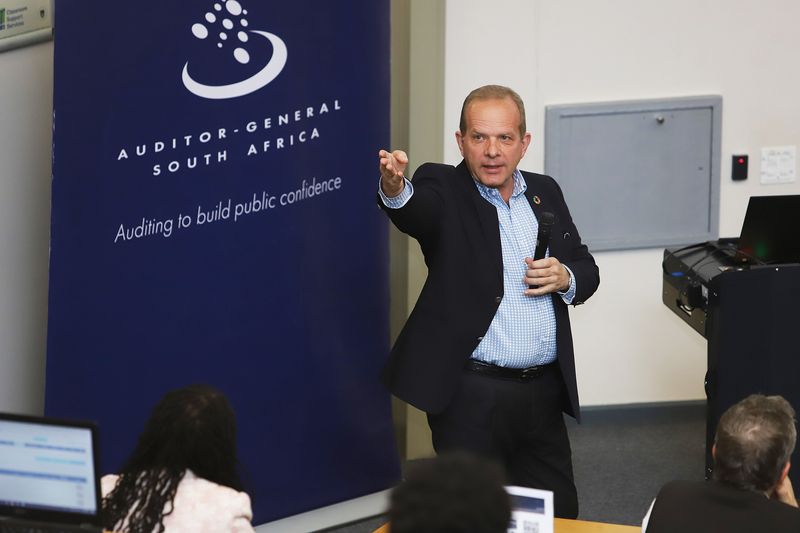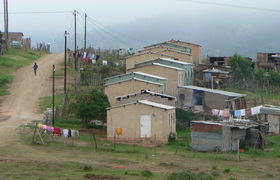SA’s municipal audit ‘not a pretty picture’
01 August 2019 | Story Sarah Middleton. Photo Michael Hammond. Read time 7 min.
Auditor-General (AG) Kimi Makwetuʼs recent report on the financial decline in the country's municipalities was the subject of a public lecture on 30 July, co-hosted by the University of Cape Townʼs (UCT) Nelson Mandela School of Public Governance.
Speaking at the event, Jan van Schalkwyk, an executive member of the Auditor-General South Africaʼs (AGSA) office, said a lack of accountability was a key factor in the shocking results of the audit.
The audit indicates that financial health at local government level has been declining since last year, with only 18 out of 257 municipalities in South Africa receiving a clean audit. This compares poorly to the 33 clean audits received last year.
Sixty-three municipalities have worsened and only 22 have shown an improvement.
This implies that ongoing advice from the Auditor-General’s office has largely been ignored, which in turn affects local government’s ability to deliver services to the citizenry, Van Schalkwyk said.
“This is the picture we see, and it’s not a pretty picture.
“Unfortunately, it means that accounting officers may not have come around to their responsibilities that are in the [Public Audit] Act.
“It means that mayors could not intervene and it means that certain departments, like the [National] Treasury, could not necessarily act.”
The purpose of the audit, which takes place annually, is to account for financial transactions that occur within local government.
“We are interested in money in, money out. There is also a performance dimension; the promises made, and then respect for the law. [Finally,] there’s the dimension of consequences.”
“This is a scary reflection on government’s ability to effect consequences.”
Best and worst
Van Schalkwyk argued that in order to understand the breakdown in accountability, it is necessary to look not only at the poor outcomes and “the fact that [this has] disabled the foundation from which [municipalities] can perform service delivery”, but also at “the fact that you’ve got known [financial] problems you can trace exactly to documentation, yet [the municipalities are] not prepared to take action”.
“This is a scary reflection on government’s ability to effect consequences.”
Of the 18 clean audits, 12 were in the Western Cape, which, along with Gauteng, performed best in this year’s audit.
“There’s not always a direct relation between a clean audit and success stories, but there tends to be a good linkage. The foundation is strong, at least,” Van Schalkwyk pointed out.
The worst performing provinces were Free State and North West, neither of which received a single clean audit. The poor performance of these provinces has been attributed to political interference and the consequent fallout, rather than a lack of competence.
Root causes
AGSA identified five main causes for the poor performance of many municipalities in this year’s audit:
- Blatant disregard for controls, compliance and AGSA recommendations.
- A capacity gap in administration.
- Vacancies and instability.
- Unethical behaviour in administration and by political leaders.
- A culture of no consequences created by leadership’s inaction.
Van Schalkwyk was clear that the outcomes cannot be attributed primarily to the “capacity gap”, namely the perceived lack of skills and competence within municipal administration.
“It’s very easy to hide behind the competence gap.”
He added that few examples of financial non-compliance have anything to do with competence.
“My silly example is getting three quotations for a basic low-cost tender. That’s not a technical issue. You don’t need [to be a chartered accountant] to get three quotations. My little niece can count to three.”
A new phenomenon that appeared for the first time in last year’s audit is the category of “outstanding audits”, which has increased from 1% to 8% this year.
“We have had to add ‘outstanding audits’. This is a very nasty category of people who say: ‘We have such little respect for accountability that we’re not even going to submit [financial statements]. We are not even going to pretend to be accountable.’ ”
“This is the picture we see, and it’s not a pretty picture.”
New legislation
New legislation, in the form of amendments to the Public Audit Act, has given the AG more “teeth” with which to tackle financial irregularities and non-compliant municipalities.
The amendments, which will only affect the 2019–2020 audit, expand the AG’s purview in three ways:
- The AG now has the power to refer suspected “material irregularities” to public bodies (such as the Special Investigating Unit and the Public Protector) for further investigation.
- The AG is now entitled to compel accounting authorities to implement the AGSA’s recommendations where irregularities exist.
- Where accounting authorities fail to implement these recommendations, the AG is obliged to issue a certificate of debt. This requires the office in question to repay the amount under scrutiny.
The legislation focuses on “material irregularities”, which refer to “non-compliance with, or contravention of legislation, fraud, theft or a breach of fiduciary duty” that results in “material financial loss, the misuse or loss of a material public resource or substantial harm to a public sector institution or the general public,” Van Schalkwyk explained.
Along with the new legislation, he said increased accountability is key to improving the audit performance for next year.
“Hopefully there are good signs about a lot of things, but we know we have a challenge ahead, and we have a lot of things to do.”
The audit results are freely available, and Van Schalkwyk urged the public to “find your municipality in the report. Try to make it personal, and see if there’s something you can do about it”.
 This work is licensed under a Creative Commons Attribution-NoDerivatives 4.0 International License.
This work is licensed under a Creative Commons Attribution-NoDerivatives 4.0 International License.
Please view the republishing articles page for more information.










